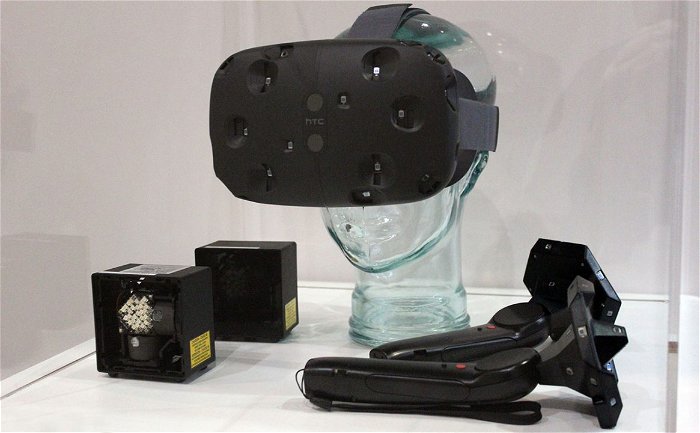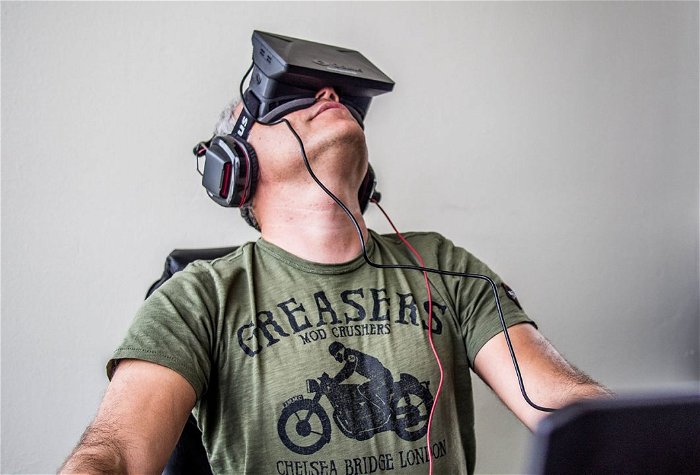Last week’s GDC had what will likely go down in tech history as virtual reality’s first big upset; Valve better known as the creators of Half-Life and the Steam digital distribution platform, unveiled their surprisingly robust VR technology, “Vive,” a collaboration between themselves and HTC. And just like that, almost as if by magic, Oculus Rift is not only NOT the only game in town for virtual reality on PCs. It might not even be the defacto front runner anymore. And that’s for a number of reasons.

For those that have been scrupulously keeping score of VR developments, this actually isn’t a total surprise. It’s been known for a while that Valve has been experimenting behind the scenes with VR. At one point they were even collaborating with Oculus Rift when Palmer Lucky’s Kickstarter project surprised everyone with a lot of positive attention. Some staff from Valve (and iD, notably John Carmack, creator of Doom) even defected over to Oculus Rift to work on the technology. Eventually, however, Valve and Oculus parted ways and now we see why. Valve had its own ambitions for virtual reality, and yes, they actually are pretty ambitious. Between the Lighthouse sensor system and the PS Move-like controls, Vive is looking like the most comprehensive VR package known today.
So what does this mean for Oculus Rift?
The most obvious factor is that it’s now got some competition. True, there was Project Morpheus before, on the PS4, but that’s a console, a closed system with specs that are never going to rival what Oculus is now showing off in Unreal Engine 4 with the latest Titan X graphics card and cooperation from Weta Digital to show off Smaug in his treasure room. Morpheus is always going to be affordable, entry-level option for VR, and up until now, Oculus enjoyed not just sole domain of the PC space, but a sizable budget for R&D as well as marketing and distribution thanks to the near bottomless pit of money that came with their acquisition by Facebook.
“And just like that, almost as if by magic, Oculus Rift is not only NOT the only game in town for virtual reality on PCs. It might not even be the defacto front runner anymore.”
Valve has the money as well, but more importantly, they have years and years of experience in game design, as well as a sizable, experienced staff that is already a solid, working team with established dynamics and production systems. These are all things Palmer Lucky had to assemble from scratch when Oculus Rift started gaining momentum. Valve has had extensive contacts with both software and hardware manufacturers, establishing solid relationships as well as creating an entirely new digital distribution method that is not only completely dominating the PC space, but is also under their control. Lucky and crew have had to forge these new alliances and draw on their manufacturing expertise as a new contender at the mercy of older, more experienced companies. And when it comes time to sell Oculus Rift games, they’ll either have to find a publisher for physical boxed retail games, and work with Valve to get it on Steam.
And finally, and this is perhaps the most important factor of all, there is the question of focus. Valve is a company focused on games. Facebook is not. Palmer Lucky may have originally started Oculus Rift as a device for gaming, but it’s highly unlikely that a monolithic company making its profit through exploiting social media as a marketing tool to companies—as is the case with Facebook—is going to maintain gaming as a primary function. They will be looking at Second Life, Instagram, Twitter, and of course, Facebook itself as ways to bring the social aspect into virtual reality and, by extension, new ways to gather user data and offer that to companies. Of course, there will be games in that mix somewhere, but Mark Zuckerberg is not an idiot; he sees virtual reality as the next technology platform, and he doesn’t want social media to miss out on it the same way the music industry ignored digital until it was far too late.
Oculus Rift has some impressive backing thanks to Facebook, but with a founder that’s less experienced in the industry than Valve, and an investor that’s looking more at the social media/marketing potential than gaming, things are looking less certain for Oculus as the default VR experience of choice on PCs. Valve has a reputation among the PC gaming audience, and, perhaps more importantly, are not a publicly listed company, and beholden to no investors for either funding or project goals. Valve can make a VR device focused on gaming, and no one can tell them otherwise. Oculus no longer has that luxury.

It will be interesting to see how the fireworks erupt between these two competing products—especially since Vive is coming out first, later this year—but it’s completely changed mood of virtual reality on PCs. Valve committing to this technology says a lot about whether this is really “just a fad.”




